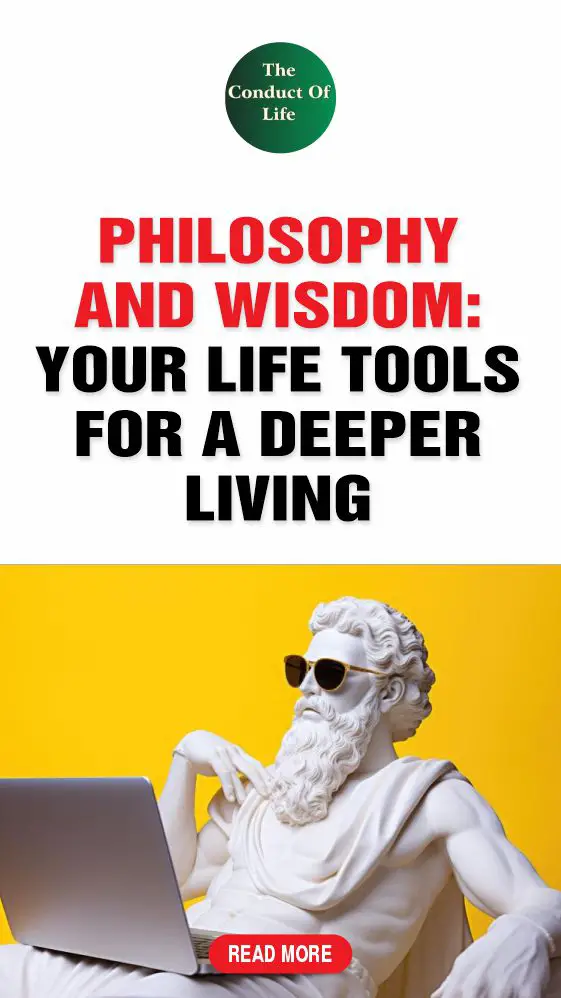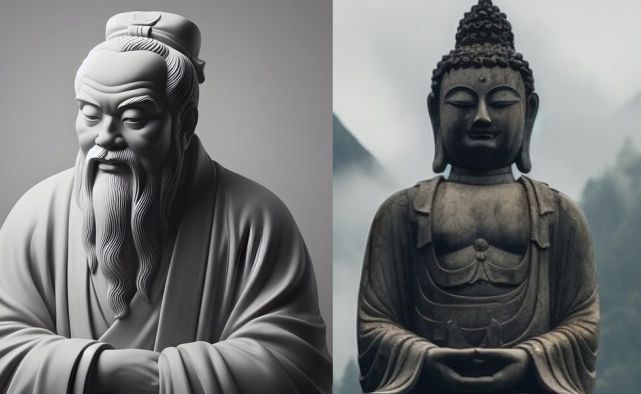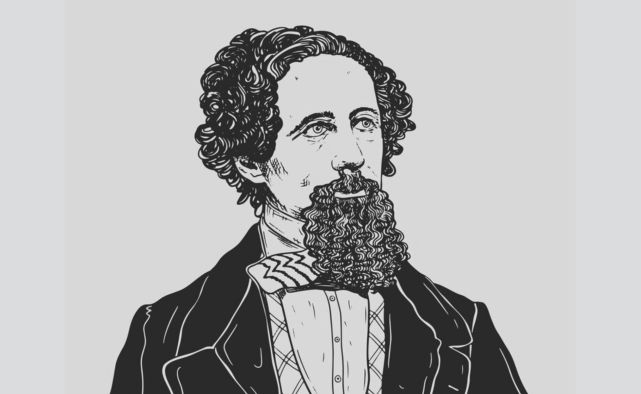What if philosophy and wisdom in the conduct of everyday life hold the answers to your biggest questions? This piece will make you question how you think and live.
You live by choices, big and small. But how do you know which path leads to a meaningful life?
Philosophy isn’t just for scholars, it’s a guide for everyday decisions.
Wisdom shapes how you think, act, and respond to challenges. From Stoicism’s calm mindset to Socrates’ self-examination, life’s greatest thinkers offer practical lessons.
Are you questioning your beliefs? Struggling with purpose? Understanding philosophical principles helps you see life, make better choices, find balance, and build a lasting legacy and impact.
This isn’t abstract theory, it’s real-life wisdom. Ready to apply it? Let’s explore how philosophy can shape your mindset, actions, and the way you conduct your life.
You might want to pin the image below.

Key Takeaways
- Philosophy encourages questioning beliefs, developing critical thinking, and sharpening reasoning for more informed life choices.
- Stoicism teaches focusing on what you can control, encouraging resilience and inner strength in the face of challenges.
- Existentialism urges creating meaning in life through freedom, responsibility, and authentic choices.
- Utilitarianism guides ethical decisions by evaluating actions for the greatest good and considering their societal impact.
- Wisdom grows from experience, reflection, and applying knowledge thoughtfully to everyday situations for better outcomes.
What is Philosophy?

Philosophy is the study of life’s biggest questions, existence, knowledge, values, reason, and the mind. It challenges you to think deeply, question assumptions, and seek truth.
Every belief you hold has roots in some form of philosophy, whether you realize it or not.
Why do you trust certain ideas?
What guides your choices?
By exploring different schools of thought, you sharpen your reasoning and develop a clearer view of the world.
Philosophy is a tool for daily life. The more you question, the more you understand.
Are you ready to rethink what you know and how you live?
History
Philosophy has shaped human thought for centuries, with different movements offering unique ways to understand life.
Some of these movements include:
- Stoicism
- Existentialism and
- Utilitarianism
These ideas aren’t just history, they influence how you think, act, and view the world today. How do these philosophies shape your decisions?
Let’s take a brief tour:
Stoicism: Mastering Your Reactions
Stoicism, founded in ancient Greece, teaches you to focus on what you can control, your thoughts, actions, and responses.
External events are beyond your power, but your mindset shapes your experience.
By practicing self-discipline, accepting hardships, and valuing virtue, you develop inner strength and resilience in the face of life’s challenges.
Existentialism: Defining Your Meaning
Existentialism urges you to take responsibility for your own life’s purpose.
Instead of relying on external rules, you create meaning through choices and experiences.
It challenges you to confront uncertainty, embrace freedom, and live authentically.
By questioning life’s purpose, you shape your own identity and personal philosophy.
Utilitarianism: Weighing Right and Wrong
Utilitarianism judges actions by their consequences, aiming for the greatest happiness for the most people.
It pushes you to think beyond personal interests and consider the impact of your choices on others.
Ethical decisions become practical, weighing benefits and harms. This philosophy shapes moral reasoning in politics, business, and everyday life.
Philosophy’s Role in Everyday Decisions
Philosophy influences the conduct of life. It affects how you think, act, and solve problems.
From ethical dilemmas to personal growth, these ideas guide decision-making.
Whether you practice Stoic discipline, embrace existential freedom, or apply utilitarian logic, philosophy helps you see the bigger picture and make choices with greater awareness.
What is Wisdom?

Wisdom is the ability to apply knowledge thoughtfully, shaped by experience and reflection that helps you make informed, balanced decisions that guide you through your conduct of life.
Wisdom isn’t just knowing facts; it’s understanding how to use them. You can gather endless knowledge, but without reflection and experience, it remains empty.
Wisdom comes from questioning, learning from mistakes, and seeing beyond surface-level answers.
It helps you make better choices, see different perspectives, and navigate life with deeper understanding.
Do you simply know, or do you truly understand and apply?
Wisdom and Experience
Experience is the foundation of wisdom. It’s through your lived experiences that you develop the ability to reflect and make decisions with understanding.
Knowledge can be learned from books or lectures, but wisdom is shaped by how you interact with the world.
The more you experience, the better you get at discerning the right choices, weighing consequences, and solving complex problems.
Your ability to adapt to change and handle moral dilemmas improves as you encounter more of life’s challenges.
Do you use your experiences to guide you, or are you simply reacting to them?
Reflection: The Path to Deeper Wisdom
Reflection is key to growing in wisdom. When you pause to think about past experiences and their outcomes, you start to connect the dots.
It’s not just about what happened, but about understanding why things played out the way they did.
By asking yourself deeper questions, you refine your judgment and adjust your future decisions.
Wisdom evolves as you reflect, and it’s not a static trait, it changes and grows as you gain more insight.
How often do you take time to reflect on your choices and learn from them? It’s important.
Intellectual vs. Practical Wisdom
Wisdom is divided into two types:
- Intellectual and
- Practical.
Intellectual Wisdom
Intellectual wisdom involves understanding theories and concepts. It’s the knowledge of “how things work” at a deeper level.
Practical Wisdom
Practical wisdom, however, is the ability to apply that knowledge in real-life situations.
Both require discernment, and the skill to recognize what matters in a given moment and respond accordingly.
Intellectual wisdom helps you understand the bigger picture, while practical wisdom ensures you make the right decisions in day-to-day life.
Do you know the difference between thinking wisely and acting wisely? Both are necessary for sound judgment.
The Relationship Between Philosophy and Wisdom: An Unbreakable Bond

Philosophy and wisdom are closely linked and deeply influence how you experience life and make decisions.
As mentioned earlier, while philosophy encourages you to think critically, asking important questions about existence, knowledge, and values, wisdom, on the other hand, is about applying what you’ve learned to make sound choices in the conduct of your life.
Let’s take a closer shot at how these happen through the points below:
Stoicism: A Path to Resilience and Wise Decisions
Stoicism, a powerful philosophy, teaches you how to focus on what you can control and let go of what you can’t.
Applying Stoic principles teaches you to maintain peace of mind in challenging situations.
It guides you to detach from short-term desires and focus on rational decisions, resulting in better choices and a stronger, more resilient mindset.
What happens when you focus on what’s within your power instead of stressing over the uncontrollable?
The Stoic way might be the key to wise decision-making in your own life.
Philosophical Ethics in Real Life
Philosophical ideas like utilitarianism and Kantian ethics can directly influence your daily actions.
Imagine facing a moral dilemma at work. With philosophical ethics and morality, you can evaluate your options, considering what will do the best or what aligns with ethical principles.
Using philosophy as a guide allows you to make informed decisions that reflect your values.
Have you ever considered how philosophical ethics shape your choices in tricky situations?
This approach doesn’t just help you decide, it also builds integrity and character.
Reflection: The Role of Philosophy in Wisdom
Philosophy is reflective by nature, encouraging you to assess past experiences critically.
When you apply philosophical inquiry to your decisions, you gain deeper insights into your actions.
By reflecting on what went well or poorly, you refine your judgment for the future.
Philosophy gives you the tools to learn from your experiences, improving your ability to make wise decisions.
How often do you stop and reflect on your choices?
The wisdom gained from this reflection can shape the way you handle future challenges.
Philosophy and Wisdom in Your Everyday Life

Philosophy and wisdom are not just abstract ideas for academic debate; they’re practical tools for self-improvement and self-awareness.
By engaging with different philosophical teachings, you can develop a clearer understanding of yourself and the world around you.
This deeper awareness lays the groundwork for making better decisions in all areas of life, from relationships to career choices.
Have you considered how philosophy could shape your daily actions and outlook?
Let’s dig further:
Mindfulness: A Key to Living Thoughtfully
Incorporating philosophy and wisdom into your daily life encourages mindfulness, which is a practice that helps you stay present and engaged.
Mindfulness allows you to reduce stress, clarify your thoughts, and make more intentional decisions.
Ancient philosophers, like Socrates, advocated for self-reflection, which is still a powerful tool today for personal growth.
By consistently questioning your thoughts and actions, you become more aware of your motivations and the consequences of your choices.
How often do you stop to reflect on your actions and thought patterns, thinking about your thinking?
Philosophy and Wisdom in Relationships
Wisdom is a powerful asset when it comes to relationships. Philosophical ideas such as empathy and respect can guide how you communicate and connect with others.
For example, Aristotle’s virtue ethics emphasizes the importance of character and moral excellence, which can help you build stronger, more meaningful connections.
Have you ever thought about how applying philosophical concepts can improve your interactions with people in your life?
Philosophy and Wisdom in Career Decision-Making
Your career decisions also benefit from philosophical reflection and wisdom.
When you examine your goals, values, and the ethical dimensions of your choices, you gain clarity about which path aligns with your principles.
Philosophy and wisdom help you weigh professional opportunities not only for their potential success but also for how they align with your sense of purpose.
Do you think about the bigger picture when making career choices?
Applying Philosophy and Wisdom for Personal Growth
By integrating philosophy and wisdom into your daily life, you gain practical tools for handling life’s challenges.
The combination of mindfulness and critical thinking allows you to make smarter, more thoughtful decisions.
Whether it’s in relationships, work, or personal growth, philosophy equips you to conduct your life with confidence.
How can you start applying philosophical principles to your everyday decisions?
Philosophical Wisdom Across Cultures
Philosophical wisdom has played a chief role in shaping human civilization.
It appears in different cultures, offering diverse insights and approaches to understanding existence.
By plunging into the wisdom traditions across cultures, you can discover both unique perspectives and common ideas that connect these philosophies.
Have you ever thought about how different cultures approach wisdom? Let’s take a deep peek:
Greek Philosophy: Rationality and Virtue

Greek philosophy, particularly through figures like Socrates, Plato, and Aristotle, focuses on reason, ethics, and virtue.
They emphasized rational thinking as the path to understanding the world and living a moral life.
Stoicism, a key Greek philosophy, teaches that wisdom comes from self-control and aligning with the universe’s natural order.
By understanding what you can control and accepting what you cannot, you can live a tranquil, balanced life.
How do you practice this kind of balance in your life?
Eastern Philosophies: Confucianism and Buddhism

Eastern philosophies, such as Confucianism and Buddhism, offer different yet valuable approaches to wisdom.
Confucianism: Confucianism, founded by Confucius, stresses moral integrity, social harmony, and virtues like respect and loyalty. It teaches that wisdom is deeply tied to relationships, both familial and societal.
Buddhism: Buddhism, on the other hand, offers a way to understand suffering and achieve enlightenment. Through mindfulness and compassion, you can free yourself from attachment and the cycle of suffering, following the path outlined in the Four Noble Truths.
How can you apply these ideas to improve your relationships and inner peace?
Indigenous Wisdom: Nature and Community

Indigenous wisdom varies across cultures, but it often shares common themes of deep connection to nature and community.
It integrates spirituality with practical knowledge, emphasizing the interdependence of all life.
Indigenous philosophies advocate for environmental stewardship, aligning wisdom with ecological awareness.
These traditions remind you that wisdom extends beyond personal growth to a shared responsibility for the world around you.
Have you ever reflected on how your actions affect the Earth and the community?
A Global Understanding of Wisdom
By studying these different philosophical traditions, you can gain a richer understanding of wisdom as a universal concept.
Each culture offers valuable lessons on how to live wisely, shaping moral conduct and ethical behavior worldwide.
Embracing these global perspectives on wisdom can help you see the bigger picture, enriching your life with diverse insights and practices.
How can you start blending these global wisdom traditions into your own life?
Influential Philosophers and Thinkers
The development of wisdom throughout history is deeply connected to the work of philosophers who have shaped how we think today.
Their ideas have influenced how we understand knowledge, ethics, and the pursuit of a meaningful life.
Let’s take closer look into some of the most influential philosophers and their contributions to wisdom.
1. Socrates: The Foundation of Critical Thinking

Socrates is often regarded as one of the first to lay the groundwork for critical thinking.
His method of dialectical questioning, known as the Socratic method, encouraged deep inquiry into beliefs and values.
Socrates believed that the pursuit of knowledge and virtue were closely linked.
He famously said, “The unexamined life is not worth living.” This approach to self-examination and ethical inquiry has been a cornerstone for exploring wisdom ever since.
How do you apply self-reflection in your daily life to gain wisdom?
2. Aristotle: Wisdom Through Virtue and Practical Experience

Aristotle, a student of Socrates, took the idea of wisdom a step further with his concept of virtue ethics.
He argued that wisdom comes from a balance between practical experience and rational thinking.
Aristotle’s idea of the “golden mean” emphasizes moderation, finding a middle ground between extremes.
This balance, he believed, is key to living a virtuous life. Consider your own life: Where can you find balance, and how does that relate to making wise decisions?
3. Confucius: Wisdom in Moral Virtue and Social Harmony

Confucius, a prominent philosopher in Eastern thought, saw wisdom as deeply intertwined with moral integrity and the well-being of society.
He stressed the importance of virtues like respect, filial piety which is respect for your parents, and education in nurturing wisdom.
For Confucius, wisdom wasn’t just about knowledge; it was about living in harmony with others and upholding societal values.
How do you apply these virtues in your relationships and community?
4. Epictetus: Wisdom Through Acceptance and Virtue

Epictetus, a Stoic philosopher, focused on the idea that wisdom lies in recognizing the limits of what you can control.
He taught that you should focus on internal virtues, rather than external circumstances, to live a fulfilling life.
His teachings emphasize accepting life’s challenges without being swayed by them.
Can you think of a situation where embracing this mindset might help you cope better?
5. Immanuel Kant: Rationality and Moral Obligation

Immanuel Kant brought a modern perspective to wisdom by integrating autonomy and moral obligation.
His idea of the categorical imperative focuses on acting according to universal moral laws, guided by rationality.
For Kant, wisdom involves making decisions that are not only logically sound but also morally right.
When faced with a decision, do you consider both its rational and ethical implications?
Contemporary Thinkers: Wisdom in a Modern World
In today’s world, philosophers continue to explore how wisdom applies to modern challenges.
These contemporary thinkers bridge the gap between traditional philosophy and the complexities of our rapidly changing lives.
They offer valuable insights into navigating life’s challenges, helping us adapt timeless wisdom to today’s context.
How do you see wisdom evolving in your own life, especially in the face of new challenges?
Your Path to Wisdom
The thoughts of these influential philosophers give you practical tools for cultivating wisdom.
Whether it’s through self-reflection, balancing virtues, understanding your moral responsibilities, or adapting to new challenges, their teachings provide a roadmap for making better decisions and leading a more meaningful life.
Where do you see wisdom playing a key role in your life right now?
Cultivating Practical Wisdom in Modern Times
In today’s quick world, where everything moves twice as fast, honing practical wisdom isn’t something that just happens.
It requires intentional effort and developing thoughtful habits. But where do you begin?
Let’s see how you can bring practical wisdom into your modern daily life:
Establish Daily Routines for Reflection and Mindfulness
One of the first steps to nurturing wisdom is creating space in your day for reflection.
This could mean setting aside time to meditate or journal. These practices encourage you to slow down, clear your mind, and truly examine your thoughts and actions.
Reflection helps you understand your motivations, reactions, and decisions, making it easier to act with greater awareness.
How can you carve out a few minutes each day to reflect?
Engage in Thoughtful Conversations
Yes! To expand your perspective and deepen your understanding, engage in conversations with people who hold different viewpoints.
Actively seek out discussions with people from various walks of life. These conversations challenge your assumptions and encourage you to think critically about the world around you.
Not only does this help you develop empathy, but it also broadens your understanding of complex issues.
What new perspective have you gained from a conversation lately?
Set Boundaries for Your Digital Consumption
In the digital age, constant exposure to news and social media can overwhelm your mind and cloud your judgment.
It’s important to set boundaries around your digital consumption. For example, designating specific times to check social media or engage with the news can reduce anxiety and help you focus on more meaningful content.
This practice frees up mental space to think more clearly and thoughtfully.
Have you noticed how your mood changes after scrolling through your feed?
Commit to Lifelong Learning
Practical wisdom isn’t something you achieve once and for all, it’s a lifelong pursuit.
Make a habit of learning by reading philosophical texts, attending talks, or exploring workshops on relevant topics.
Learning about ethics, human behavior, and life’s big questions helps you develop the skills to make better decisions.
Stay curious and always be open to new ideas.
What’s the last book or article you read that expanded your thinking?
The Balanced Approach to Developing Wisdom
Cultivating practical wisdom in modern life requires a balanced approach. It’s not just about reflecting and learning, but how you engage with the world and the people around you.
When you reflect regularly, engage in wide conversations, set boundaries on digital distractions, and commit to continuous learning, you can sharpen your decision-making skills and approach life’s challenges with greater clarity.
What part of your life could benefit most from this approach?
Debunking Misconceptions about Wisdom and Philosophy
Many people misunderstand wisdom and philosophy, which can lead to confusion about their true meanings.
There are some common myths that you might have come across. Let’s take a look at these and set the record straight.
1. Wisdom Is Just and Accumulation of Facts
One widespread misconception is that wisdom is simply an accumulation of facts.
While having information is helpful, wisdom goes beyond just knowing things.
It’s about how you use that knowledge in real-life situations. True wisdom comes from your ability to apply what you know in practical ways, informed by experience and emotional insight.
So, it’s not about memorizing facts but understanding how to act on them.
Think about it: How do you use the knowledge you have? Are you applying it to solve problems, make decisions, or understand others better?
2. Having All the Answers if You Must Be Wise
Another myth is that to be wise, you must have all the answers. In reality, the wisest people are often the ones who are comfortable with uncertainty.
They don’t claim to have all the solutions but instead, ask questions that lead to deeper thinking.
Embracing complexity and not needing immediate answers is a key part of wisdom and philosophical thinking.
It’s about exploring ideas, and recognizing that life isn’t always black and white.
How comfortable are you with not having all the answers? Can you accept the gray areas and still find clarity?
3. Philosophy only for Academics
Some view philosophy as a purely academic subject with little relevance to day-to-day life. This is false.
Philosophy offers practical tools to help you make decisions, deal with ethical dilemmas, and understand yourself better.
Far from being abstract, philosophical thinking can guide you through the tough choices you face, whether in your career, relationships, or personal growth.
Have you ever applied a philosophical concept to a real-life situation? Think about how asking yourself “What is the right thing to do?” or “What do I value?” can help you move forward.
Once you break free from these misconceptions, you’ll see how wisdom and philosophy are valuable in your daily life.
Frequently Asked Questions
What is philosophy, and how can it help in everyday life?
Philosophy challenges beliefs, encourages critical thinking, and guides decision-making by offering practical tools for personal growth.
How does Stoicism contribute to wise decision-making?
Stoicism teaches focusing on what you can control, developing inner strength, and making rational decisions for resilience.
What role does wisdom play in making life choices?
Wisdom helps make informed decisions, applying knowledge with experience and reflection to navigate challenges thoughtfully and responsibly.
How can different philosophical traditions shape our understanding of wisdom?
Philosophies like Greek, Eastern, and Indigenous wisdom provide diverse perspectives that deepen our approach to life and ethics.
Final Thoughts
Philosophy and wisdom are not abstract concepts reserved for scholars; they provide essential guidance for the conduct of life.
By exploring timeless philosophical ideas, you gain the tools to question your beliefs, understand your experiences, and make wiser decisions.
These principles help you develop resilience, moral integrity, and clarity in everyday choices.
From Stoic resilience to existential freedom, philosophy offers powerful insights for creating a meaningful, purposeful life.
Embrace these ideas, and apply them to your actions, and you’ll find greater balance and self-awareness, transforming your mindset, decisions, and relationships.
Pious Clements is the insightful voice behind "The Conducts of Life" blog, where he writes about life ethics, self-development, life mastery, and the dynamics of people and society.
With a profound understanding of human behaviuor and societal dynamics, Pious offers thought-provoking perspectives on ethical living and personal growth.
Through engaging narratives and astute observations, he inspires readers to navigate life's complexities with wisdom and integrity, encouraging a deeper understanding of the human experience and our place within society.
